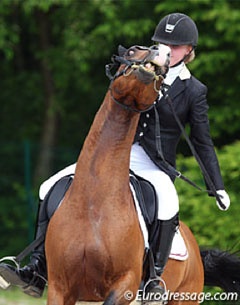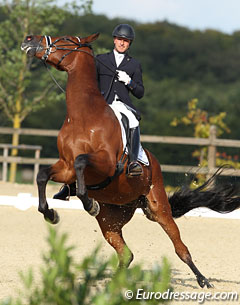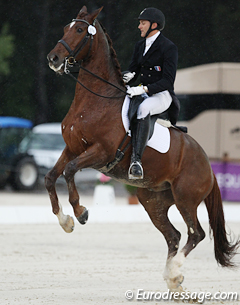
The true art of dressage is not in winning prizes or doing tests or even in showing off the talent and skill of horse and rider, it's in the training. There is no greater reward for a rider than when they take a challenging, difficult or "given up on" horse and work with him, encourage him, foster him, motivate him, and eventually enable him to reach his full potential.
Once a "die-hard" showjumping rider Beatrice Marienau began her dressage career training quarter horses. Having been successful at Grand Prix level on a number of very different horses, Beatrice doesn't necessarily believe a horse is difficult, but rather that a horse may have certain performance issues or difficulties, due to their conformation, health issues or previous training experiences.
"Over the years there would be one particular horse that comes to mind, which I love dearly, but had major issues," Marienau reminisced. "We got him as a gift, a beautiful 6-year old liver chestnut Oldenburg gelding. He had exceptional movements, if you could get him in the ring."
Talking about every ring, not just the competition arena, Beatrice spent almost a month just getting the horse into her indoor arena. "Once we actually got him in our arena, it was just a matter of time of the day, the month, or the year, and layout of facility. Spooking, spinning, rearing, stalling, backing, taking off, the horse would display one or all of the above," she said.
Learning to ease off the pressure in her seat and leg aids for a little while most of the time, Beatrice would just let the horse observe his surroundings and then ease him into a forward sideways movement. "We never knew exactly what would set him off and so eventually I said let's just take him to the shows and see what happens and when we began competition. It was always a bit of a gamble. He could be stunning and get super high scores or it could end in complete disaster. The comments on the sidelines would range from oh and ah to uh and yikes.
The pair worked our way slowly through the levels and became USDF Reserve Champion Second Level. Unfortunately however, the more Beatrice asked for the collective work and bringing his poll into a higher position, the more he would panic and rear up. "We got to the point that we almost went over backwards," she explained. "That is when my trainer said it was getting too dangerous. I didn’t want to accept the option to give up, especially because I felt it was a trust issue. He would follow me like a dog and most of the time, there was really nothing to spook about. So I took him to CSU Animal Hospital, where they did a complete check.
 Within a short time Beatrice's horse was diagnosed with a cherry size cyst in each eye, which didn’t allow the pupil to shut fast enough, so that when it changed from dark to light (shadows for example) it was like an electric shock to the horse's brain. "Due to that issue, he learned to hold his head in a protective position that created arthritis in his top two vertebrae. We tried several treatment options, but no change. So now he enjoys his retirement on a big pasture with another rescue horse buddy.
Within a short time Beatrice's horse was diagnosed with a cherry size cyst in each eye, which didn’t allow the pupil to shut fast enough, so that when it changed from dark to light (shadows for example) it was like an electric shock to the horse's brain. "Due to that issue, he learned to hold his head in a protective position that created arthritis in his top two vertebrae. We tried several treatment options, but no change. So now he enjoys his retirement on a big pasture with another rescue horse buddy.
Learning over the years not to give up on anything, Beatrice recogonizes that at at the same time, there are good reasons to know when to stop.
Runner up in the World Cup Final qualifier's, Italy's Valentina Truppa, also knows that some horses can present special training issues. One horse she had as a young rider spent too much of his energy going against the rider. "The horse was tireless and very spooky, so when he decided not to go through a corner or heard any noises, he turned away very suddenly," said Valentina.
Unsure what made the horse behave this way, Valentina says the horse was gelded late and that perhaps he still thought he was a stallion. "I remember I had to ride him one and a half hours and nothing went better, actually to the contrary he got more and more condition. One year we were in Stadl Paura competing in the Prix St Georges and my dad tried to lunge him for 45 minutes. After that I rode him 45 minutes, but at the end of my test (bad test!) I told my father "he must be possessed"."
Sending the horse to her then trainer, Hubertus Schmidt, he stayed there for 6 months and Valentina says although the situation was a little better with such an experienced rider, he was still just not easy. "Hubertus got injured in his back and finally told us that there was no way for the horse to overcome it. The only possibility to ride him was to come to a compromise. So in the end we sold him."
Disappointed to have given up on a talented horse, Valentina learnt from the experience that sometimes it's better to have a horse with little less movement but with a good mind. "Power is nothing without control!"
 French dressage rider Alexandra-Victoria Bonte's most difficult horse was a Jazz she bought as a 2-year old, when she was 14. "I had to geld him as soon as he arrived home only barely broken," says Alexandra. "He was a very challenging horse, temperamental and exceptionally spooky! I was unable to compete him until he was 8 due to his extreme fear of everything! I had a horse whisperer see him which did not help, and I tried riding him outside and that did not help either. It was when I started to jump him which helped improve his confidence."
French dressage rider Alexandra-Victoria Bonte's most difficult horse was a Jazz she bought as a 2-year old, when she was 14. "I had to geld him as soon as he arrived home only barely broken," says Alexandra. "He was a very challenging horse, temperamental and exceptionally spooky! I was unable to compete him until he was 8 due to his extreme fear of everything! I had a horse whisperer see him which did not help, and I tried riding him outside and that did not help either. It was when I started to jump him which helped improve his confidence."
From there the duo went on to Prix St Georges and schooled him through all the Grand Prix movements. He proved to be exceptionally talented in the piaffe. She sold him as a 10-year old ready for Grand Prix. "Although we had many difficult times I have no regrets as he definitely taught me how to really ride and stay on anything," said Bonte.
Sometimes horses come to us with problems, or sometimes training leads them down difficult paths, but our role as dressage riders is to find the key to communicate with the horse and hopefully unlock what is troubling them. "What I love about dressage is the challenge of taking on a difficult horse and turning it into something incredible. I am a firm believer that the best horses are the most sensitive ones and usually what some riders call "the most difficult ones"," added Alexandra.
We don't give up on people for being difficult and in fact the best people are always the ones that have been through the most, overcome it, and challenge us to be better ourselves. Let's all hope that a challenging horse crosses our path who, just like challenging people, will make us think, work hard, listen even harder, and ride in the best way we possibly can, in partnership with our horse.
by Sarah Warne for Eurodressage
Photos © Astrid Appels
Related Links
Sarah Warne: Right Way, Wrong Way, Good Way, Bad Way...My Way?
Sarah Warne: Creating that Special Something